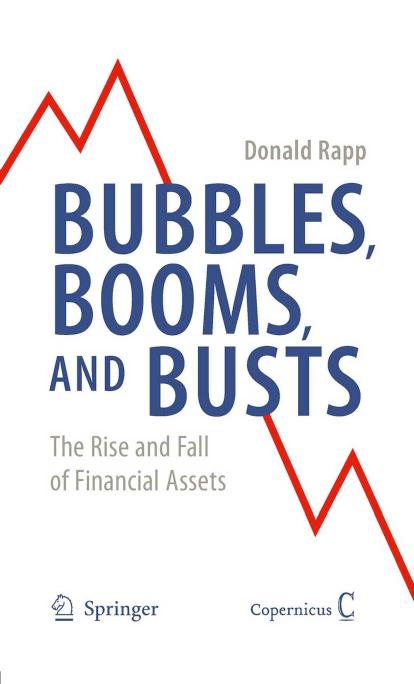Bubbles, Booms, and Busts by Donald Rapp

Author:Donald Rapp
Language: eng
Format: epub, pdf
Publisher: Springer New York, New York, NY
Furthermore, Europe’s recovery from World War I did not revive to prewar levels of production, and the Europeans failed to reclaim their old markets from the USA or create new markets to compensate for the losses. As a result, nations still maintained high tariffs, which raised prices and cut world trade.
This question has been debated by economists for more than 100 years, as to whether tariffs promote or oppose prosperity. Most economists in the twenty-first century seem to be enthusiastically in favor of free trade , and it is widely believed that tariffs contributed to the worldwide depression of the 1930s. There seems to be some merit to this argument. However, as in most economic questions, the issues are complex. In an ideal world composed of nations of roughly equal size and gross national product (GNP), without cartels and other artificial controls of supply and demand, one can rightly argue that with free trade, each nation can produce the products for which it is most capable and efficient. Without trade barriers, all nations benefit from the most efficient production wherever it may occur, and prosperity would be shared by all. Free trade is believed to be a boon in such a world. However, this seems to be the hypothetical world of economists. (I attended a lecture by a noted advocate of free trade , who explained how one country would produce autos, and another would produce TV sets, etc. Someone in the audience raised the question: “What will the US do?” Another person in the audience shouted: “Consume!”) In the real world of the early twenty-first century, with the US being a major industrialized power, and many developing countries anxious to industrialize with cheap labor, free trade provides short-term advantages to both the US and the developing nations. The US allows its manufacturing base to be usurped by the developing nations, and in return the citizens of the US can purchase cheap goods made by underpaid labor in the developing countries. Eventually, however, the loss of manufacturing in the US will take its toll with a loss of jobs and independence, and as wages inevitably rise in developing countries, the benefits to the US will gradually disappear, and the US will be worse off. While the US has been actively pursuing this policy from about 1990 to 2013, the days of reckoning seem to be approaching. Furthermore, in a world where oil plays a dominant role, and oil resources are distributed sporadically among mainly reactionary and often despotic nations, there cannot be any actual “free trade.” Eliot Janeway said11
Americans rushed to buy import bargains, even while suspecting how much their savings as shoppers would cost them income earners. Dogmatism rooted in the cliches of free trade hypnotized the victims into welcoming the losses as gains.
Optimism fed on the euphoric lure of America’s presumed growth into a “service” economy free from the import threat—until depression struck the entire service industry, from restaurants to hospitals and even television networks. It jolted the
Download
This site does not store any files on its server. We only index and link to content provided by other sites. Please contact the content providers to delete copyright contents if any and email us, we'll remove relevant links or contents immediately.
International Integration of the Brazilian Economy by Elias C. Grivoyannis(98865)
The Radium Girls by Kate Moore(11970)
Turbulence by E. J. Noyes(7977)
Nudge - Improving Decisions about Health, Wealth, and Happiness by Thaler Sunstein(7656)
The Black Swan by Nassim Nicholas Taleb(7056)
Rich Dad Poor Dad by Robert T. Kiyosaki(6513)
Pioneering Portfolio Management by David F. Swensen(6255)
Man-made Catastrophes and Risk Information Concealment by Dmitry Chernov & Didier Sornette(5956)
Zero to One by Peter Thiel(5731)
Secrecy World by Jake Bernstein(4698)
Millionaire: The Philanderer, Gambler, and Duelist Who Invented Modern Finance by Janet Gleeson(4421)
The Age of Surveillance Capitalism by Shoshana Zuboff(4244)
Skin in the Game by Nassim Nicholas Taleb(4201)
Bullshit Jobs by David Graeber(4138)
The Money Culture by Michael Lewis(4132)
Skin in the Game: Hidden Asymmetries in Daily Life by Nassim Nicholas Taleb(3961)
The Dhandho Investor by Mohnish Pabrai(3722)
The Wisdom of Finance by Mihir Desai(3693)
Blockchain Basics by Daniel Drescher(3540)
